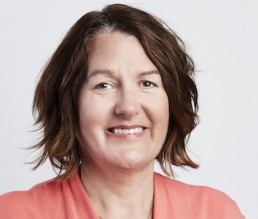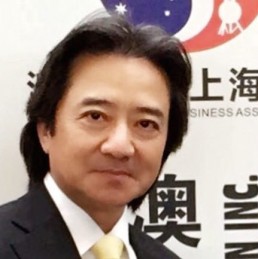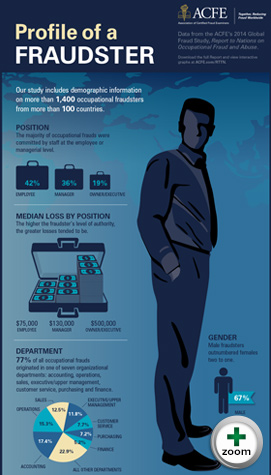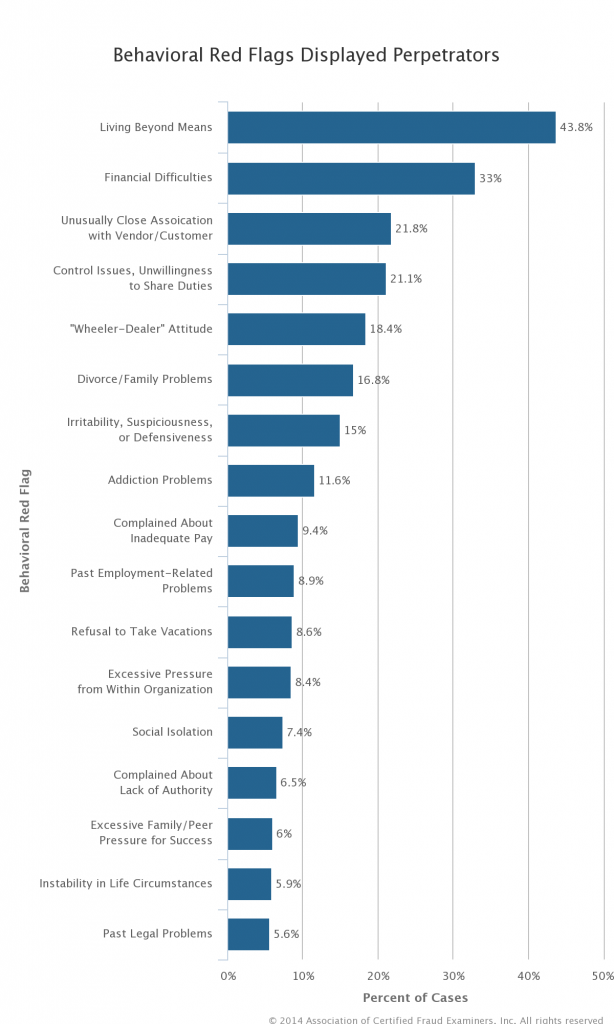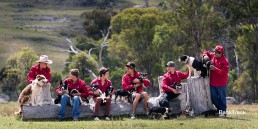Introducing Sue Karzis, CEO, State Schools’ Relief
Introducing Sue Karzis, CEO, State Schools’ Relief
1 in 10 Victorian state school students is supported by State Schools’ Relief. Alarming numbers which have been growing over recent times.
Only 5.4% of fortune 1000 companies are led by women. Another alarming fact. However, the good news is that at State Schools’ Relief Sue Karzis leads this major not-for-profit [NFP] organisation.
We sat down with Sue to learn more about her role and the role which SSR plays in our children’s everyday lives. Thanks, Sue.
1. Congratulations on being the first female CEO of State Schools’ Relief. Prior to being appointed did you realise you were making history?
I had absolutely no idea! I am excited to make history though, especially if it encourages other women to put themselves forward for leadership roles.
2. Being the first female CEO since the organisation started in 1930, what challenges have you faced?
The challenges I have faced are the challenges that most CEOs in NFPs face – that is, how to increase fundraising, revenue, improve systems and processes and become sustainable into the future. I have had lots of support from the SSR Board, so I am very lucky.
3. Do you believe that women bring a different perspective to senior roles?
I think that women often approach leadership differently. I think that the traditional notion of power is an antiquated one and leaders of today need to be collaborative and coach staff to achieve a shared strategic vision. For staff to be engaged, they need to buy into what the organisation is trying to achieve. In the case of State Schools’ Relief, our staff understand the huge impact that our work has. Last year alone, we assisted over 56,000 children and young people with school uniforms, shoes and other educational resources. Our mission is to remove the barriers that underprivileged children face so that they can engage with education and realise their full potential.
4. What makes you smile at work?
The feedback about what a difference we make in the lives of children – when I am having a bad day, I often look at it and it puts everything into perspective.
5. What frustrates you at work?
When IT doesn’t work! Other than that, delays in getting things done. Once I have an idea, I really want to see it through, and it can be hard to be patient.
6. The topic of women in the workforce especially the number of senior leaders is very topical, why do you think that is?
I think that as women, we are living in a watershed moment; what is happening with the #MeToo movement reflects a new awareness of women’s rights and is highlighting areas where there is an obvious disparity. To have only 5.4% of Fortune 1000 companies led by women shows that despite best efforts, the glass ceiling still exists, and women are not attaining leadership positions at the rate that they should.
7. What do you believe organisations need to do to improve the number of senior female appointments?
I think that female leaders need to mentor their colleagues and ensure that they are championing them, creating opportunities for them to step into leadership and supporting the sisterhood rather than seeing other women as competition. We need to tackle unconscious bias so that when hiring, we don’t have a preconceived idea about potential candidates, and we need to keep talking about the issue and empowering women of all ages to feel like they are worthy of the top jobs.
8. Which leaders inspire you and why?
The leaders I find most inspiring are humble and inspired by their own experiences to make a difference. Rosie Batty inspires me with her strength and determination and Malala, who has overcome the voice of young women battling discrimination and adversity all over the world.
9. How do you measure success?
Success to me is measured by the impact you are having. Leading an organisation like State Schools’ Relief, I know we are having a huge impact on the lives of those we help. From an organizational perspective, achieving strategic objectives, such as establishing a social enterprise to retail our school shoes with a view to funding our charity is a true measure of success.
10. What does a typical day look like for you?
Most mornings I try to catch up on emails, I have at least 2-3 meetings most days as well as attending stakeholder events and media opportunities whenever required. In an organisation like SSR, I am fairly hands-on, so I am often involved in operational matters and meeting with staff to solve problems on a daily basis.
11. How would others describe your leadership style?
I have been told I am transparent, hands-off and I trust and empower those around me to make decisions and feel invested. I believe that any leader is only as good as the team that they have around them.
Thank you, Sue. For more information about State School’s Relief please visit their website by clicking here.

Community values & professional services - two key pillars to success for Marriot Support Services
Janine Simpkin, CEO, Marriott Support Services speaks with us today about the organisation she is proud to lead. In this interview, Janine shares how the organisation creates exceptional opportunities and support for people with disabilities, what it takes to lead a business in today's times and how others can get involved in such a wonderful and much needed support service. Thank you, Janine and congratulations on the success of Marriot Support Services, its social enterprises and the fantastic work you, your team and the volunteers conduct.
- Where does the funding come from to support Marriott Support Services and what does the organisation do?
We are moving to The National Disability Insurance Scheme [NDIS] which is a new way of providing support for people with a disability, their families and carers. Marriott supports over 100 people with more significant disabilities. We focus on their strengths and help them to reach their potential in whatever space they choose like employment, volunteering, social connection or skills development and learning. Sometimes that is by accessing their community with help and other times by upskilling them in areas where they can learn to be more independent like learning to use public transport. Many of the younger ones in this group will move to less support or employment options as their skills increase. It is all based on individuals and their goals in life.
- Can you explain about the two social enterprise businesses which Marriott operates?
We have two social enterprises. The first, Marriott Industries employs about 85 people with disability to work in our warehouses. We pack gifts for Xmas, repack items from overseas and pack sample bags for new mums or events. We pack spices into jars to sell in gourmet shops and complete light assembly jobs; these are a snapshot of some of the work that we do.
Our second social enterprise is the Enviro-Management Services which is classified as a large business that tenders for work in the open market. Enviro integrates people with disability into crews and work is always off-site. We hope to expand this service to training people with disabilities with the skills to work in the open employment market.
Both social enterprises contribute to our bottom line – thus allowing us to be innovative and strategic in the way we deliver services. However, we do rely on financial assistance for the added extras that can change someone’s life forever. Our new Enviro project will not start until this happens.
- If an organisation is looking to recruit and support a person with a disability what advice could you offer them?
Look at someone’s strengths. Design a job around the person, what can they achieve – chances are the time you spend doing this will create a loyal employee who will be hard working and dedicated. With the NDIS there is customised employment support which will help the individual learn a new skill or modify an existing one. Everybody, regardless of education, race, socioeconomic situation or abilities have strengths and areas that need some work – a person with a disability is no different. They can learn, adapt and will always work harder if they are doing something that they are naturally good at – as we all do. People with disability have been found to be very loyal employees with less absenteeism.
- What types of volunteers can add value to Marriott Support Services and how can someone get involved?
Marriott loves volunteers. Our Community program has volunteers to support art, tennis, dancing, cooking, basketball competition and gym– and so the list goes on. Volunteers also help out with admin – as we run on the “smell of an oily rag” and want to use our resources in more direct support. We have skilled volunteering too like with marketing or IT; almost any skill is great to have in a volunteer and can be short term or long term. We also have corporate volunteers, like from NAB, who come in groups as part of their corporate social responsibility programs.
- How would you describe the auditing team at McPhail and Partners?
Very reliable, approachable, pleasant and communicative. Let’s not forget extremely thorough, all of the qualities we admire and need in an auditor.
- What makes you smile at work?
My staff and the way they communicate with everybody – regardless of their abilities. Corridor chats with staff and the people we support uncover so many good stories, and we tend to be very open.
- What makes you feel frustrated at work?
Compliance to the extreme, however absolutely required in this field. We work with a marginalised and vulnerable group who need extra support and protection.
- How would you describe your leadership style?
Open, honest, consultative, and I work to people’s strengths. I believe a CEO should be the face of an organisation and lead by example, especially in this field.
- Industries are extremely competitive nowadays, how does Marriott Support Services remain relevant and competitive?
We are honest about what we do well and work to our strengths. We work well with “behaviours of concern”, these may limit someone’s ability to participate in the community, and we have great success in enabling people with behaviours of concern to be able to engage with the community by learning to manage their behaviours. It is life changing for the individual and their families. Another strength is getting people into employment, and that is also life-changing, giving some financial independence, developing skills and peer connections is excellent for the individual, their family and the community.
We use our local community and partner with them to expand opportunities and build social inclusion. For example, we have a small group volunteering in a commercial kitchen in an aged care facility to develop their skills and social connection and maybe a pathway to training and employment. We will do everything we can to help an individual reach their goals. We are also not afraid to say that someone may be better with another organisation that better suits their interests or needs. This will always be with an organisation that we trust and know well. We are “niche” in the support we provide and work closely with our community to develop and grow to meet their needs.
- How important is social media to Marriott Support Services?
In the past, we have worked on “word of mouth” and reputation. We recognise that to remain viable and grow in the spaces that we wish to expand we need social media. Social media is a wonderful way for the people we support to connect and grow and to reach new customers. We use stories to inspire people to aim high and to follow a dream and to inform people about what is out there, for example, helping people understanding the NDIS. Social media is an excellent way for us to communicate and we are always looking to improve.
For more information about Marriott Support Services visit their website by clicking here.

Inspiring business story - William Wang and World Wire Cables
William Wang's story is inspiring. Arriving in Australia with only $60 in his back pocket, he went on to study an MBA and build an extremely successful electrical cable business, without knowing much about cables at that time! He is now called upon to give interviews and speeches to academics, Government and TV stations. Thank you, William for sharing your story with us and we wish you all the best with your upcoming speeches.
1.You were recently interviewed by Shanghai TV station, What was this about?
The TV interview is for a segment called '1st Economy'. It looks at how Chinese overseas have survived, developed their business and mixed with the community. I am part of the third group of Chinese to arrive in Aus. The first was 500 years ago that would pass through Darwin on route to other South East Asian countries; the second was 160 years ago when Chinese came during the gold rush. We were the first group to arrive by plane and not by boat.
2. In June, you will be one of only two Chinese businessmen invited to deliver a speech at Government House, to the leaders of China and Australia as well as international academics. Tell us about this.
I have been asked to speak about my experience as a Chinese Businessman in Australia, about how I have been able to integrate into the community, the challenges I faced when I came to Australia.
3.How did you build up a successful business?
The Chinese Economic Reform resulted in a lot of deregulation & export was encouraged. There was a lot of private investment in manufacturing factories, so our business had access to state of the art technology and was able to develop high-quality cables such as fire grade, mining, and extra high voltage cables which are highly sought after. This combined with the mining boom and favourable commodity prices from 2006-2014 saw our business grow and really succeed.
4.How did you gain access to the high-quality Chinese manufacturers & why cables?
I came to Australia with USD$60, worked three jobs including weekends while doing my MBA in International Trade - Non-Conventional Trade (Barter & Counter trade), and at the same time supporting my wife and child. Non-commercial trade was similar to the 'barter' system. I worked with AWB and traded with countries such as China, and the soviet union. When I first started, it was initially a barter system, then moved to Letter of Credit as China had little US$. Wheat was traded for other commodities such as minerals. I dealt with a lot of machine tools, and when asked by China as to what commodity I would like to trade, I suggested Cables. As a result, I was given access to high-end manufacturers in China.
5. With no experience in cables you would have had some obstacles to overcome, what were some of them?
Cables come on large reels & when I got my first order for 100m, I had no way of unwinding the huge reel of cables that had been shipped from China or measuring the amount to cut. So I built a machine to unwind the cables. I used wood from Bunnings and bicycle wheels (from the bicycle I used to ride to university) and bought a motor to unwind the reel. I then developed an electronic device to attach to the cable to measure it as it was being unwound. (Please see image below).
6.The world is getting smaller, which industries do you believe will shine in years to come?
Infrastructure is the future. A lot of people in China have applied or are on their way to Australia and are looking to invest. Australia's population was 16 million 30 years ago, it is now 24 million which is almost 50% increase, but infrastructure has not grown at same pace. Shanghai has the same population as Australia, but they have 13-15 underground subways, express railways, and highways. Melbourne has yet to see an express railway. Investing in Hospitals - nowadays even private health insurance can result in wait times and shared wards. There is a lot of catch-up opportunity.
7.You are also quite involved in the community, can you tell us more?
I am the honorary president of the Shanghai and Australian Business Association as well as the president of the Chinese Golf Association. I hear Brian McPhail loves his Golf; perhaps you can organise a game!
Click here for more information about World Wire Cables.
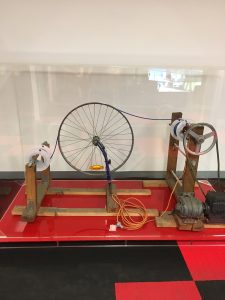
Learn about the Alkira Centre - helping others.
1. Ray, you have been the CEO of Alkira for over 20 years, that is quite the milestone! How did you get end up working for Alkira, was it an industry that had a special connection for you?
Following on from an accountancy role with International Harvester; Human Resources, Production Planning and Marketing Services positions within a family Pet Food and Soap manufacturing company in Melbourne and Shepparton, I entered the Disability field in 1985 in Shepparton as the General Manager of the Goulburn Valley Centre for the Intellectually Handicapped. I then moved back to Melbourne with my family to join Alkira Centre – Box Hill in 1995 and 21 years later I am still here!
The attraction to this industry is THE PEOPLE – not only the dedicated and talented staff that are part of Alkira and are responsible for delivering the quality services, support and opportunities for the adults with intellectual disabilities that are involved in our services, but especially the people who we provide services for – their uniqueness, friendliness, joy for life and achievements are the reason why I come to work each day and have done so for so long. Like John who almost every day takes the time to come and say hello, ask about my family and “how are you today” or the big smile on Bernie’s face as she struts the catwalk in a ‘Wearable Arts’ event
2. According to your website ‘Alkira’ means a ‘happy place in the sun’. Can you tell us a bit more about how and why this name was chosen and how Alkira is different to other disability support providers?
From “A Short History of Alkira” (2000):
“And so it was that on 18th June 1955, the training centre at Thurston Street Box Hill was officially opened. One of the guests at this opening was Mr. Crosbie Morrison, who had been asked to provide a name for the training centre. After seeing the centre he stated it to be a bright and sunny place, and chose the aboriginal name “Alkira”.
The word “Alkira” comes from an Aboriginal language meaning “bright
and sunny”. For many it has come to signify “a happy place in the sun”.
3. What do you love most about your job or (this industry)?
Again, THE PEOPLE! People with disabilities, work colleagues, family members, industry colleagues, Board Members – all are generally dedicated to the cause and align with both my and Alkira’s values.
4. What would you struggle with the most in your job or in this industry?
Time – trying to balance the vastness, complexities and breadth of the role alongside the personal lifestyle and family commitments. The role is complex because it crosses over many aspects of management – from financial oversight to capacity building and development projects, property maintenance, transport logistics, keeping up to date with industry and funding changes, dealing with a range of external people and organisations and internal people management. It also has a high focus on monitoring service delivery performance to ensure Alkira is delivering what people tell us they need and want, within financial and staffing capabilities.
5. Tell us about a rewarding moment for you in the business and your involvement in it?
The closure of a 30-bed hostel and relocation of people into houses in the community. This involved gaining the commitment of the Alkira Board, convincing family members of residents at the time and the residents themselves of the potential massive benefits to their future lifestyle.
The most rewarding moments was seeing the changes in people – residents have expressed that they are now much happier, can cook their own meals, take pride in their own rooms and enjoy the homely atmosphere of where they live. Family members have also commented very positively on the changes and progress in their sons and daughters and that were also healthier now they are part of a smaller houses in which they participate in a homelike environment and have their ‘own space’ to enjoy.
6. There must be many interesting and funny incidents you would have experienced while at Alkira, can you tell us about one or two?
Staff Christmas parties, where staff members relaxed and ‘performed’ and where we saw aspects of character that were not normally exhibited in a normal work day. The classic was the handing out of staff Christmas gifts by our own in house personalities ’Kylie Mole’ and ‘Uncle Arthur’.
7. Tell me about a memorable client you have gotten to know while working at Alkira?
Vincent Pederson is an Aboriginal client who always says hello, has a unique and special handshake that he insisted I learnt and also has a collection of different caps that must require a separate wardrobe to house.
8. If you had to sum up your time with Alkira using 5 words, what would they be and why?
- Long (but seemed short)
- Ever-changing
- Stimulating
- Engaging
- Rewarding
9. What do you do when you are not working or to relax?
Bike riding, social tennis, family time, travel, camping, beach time.
We would like to thank Ray Cranwell, CEO, for his time and for sharing his insights into this great organisation, thank you.
You can read more about Akira by visiting their website.
Three Trends Family Businesses Should Watch

Generational Handovers with Baby Boomers planning their retirement, family businesses everywhere are facing a high-risk changing of the guard. As the Baby Boomer generation moves into their retirement years, Australian family businesses are facing the largest intergenerational transfer of wealth and leadership in history. Recent statistics shows that nearly two-thirds of current family CEOs are aged over 50 and two-thirds of family businesses intend to pass ownership on to the next generation in the next five years. Unfortunately, surveys have shown that family businesses are not prepared for succession. A 2013 national survey by KPMG found that just one-third of Australian family businesses considers themselves succession-ready.
Success rates are poor
Statistics about intergenerational business and wealth transfer are grim: the vast majority of families lose their wealth by the second generation. By the third generation, the situation is worse; 90 percent have lost most or all of their wealth. The reasons? Succession failures usually happen because of poor planning, poor communication, and family conflict after the death of a parent. Solution: Start planning for succession now. Usually, a five- or 10-year horizon is necessary adequately prepare the business and its new leader for the transition. Proper planning involves a business valuation exercise and the establishment of formal timelines. Family businesses often have the added complications of competing successors, as well as family members having differing perspectives on the future of the business. Business leaders who are uncertain about how to go about creating a succession plan would do well to attend one of the many courses offered on succession, or consult with a family business adviser who can provide recommendations.
Multiple generations in the kitchen
Many family businesses are moving into the second or third generation. With life expectancies increasing and current leaders reluctant to retire, businesses will have to learn to cope with the perspectives and priorities of multiple generations. Just as "too many cooks spoil the broth", too many generations can cause a variety of problems within a business when their roles aren't defined, or younger generations feel shut out of decision making by their elders. Solution: Communication, communication, communication. Giving family members space to air grievances and have their opinions heard is critical to the healthy functioning of a family business. Many business leaders, accustomed to being the family visionary, aren't able to let go of their privacy when new generations start to take leadership roles. Creating succession plans that clearly outline when and how new leaders are to step up can help smooth the eventual transfer of leadership. However, until then, allowing each generation of the family to feel included in the strategic direction of the firm is vital to family (and business) harmony. Retreats, family councils, and other non-business forums can also offer opportunities to bridge the generational gap.
Non-traditional structures
The definition of a "family business" and the makeup of its family and non-family employees have evolved considerably in the past and will continue to change. Families are complex entities and the introduction of second spouses, half siblings, adopted siblings and new family members makes ownership and management issues complicated if any businesses have non-family employees and executives who contribute to business success at a very high level. Not all family members participate in the family business the same way. Finding ways to recognise contributions to the business while defining ownership is critical to maintaining business function while avoiding family drama. Solution: Family businesses that intend to become multi-generational concerns should separate the ownership structure of a business from its management through the issuance of shares, or another mechanism. This separation has the dual effect of keeping ownership of a firm within the family while allowing for professional management. Families should also institute financial agreements such as shareholder agreements, pre-marital agreements, and other documents that define expectations and protect family wealth. •
This article has been written by Kim Harland is director, client services, at FINH
Success Will Come and Go, But Integrity Is Forever
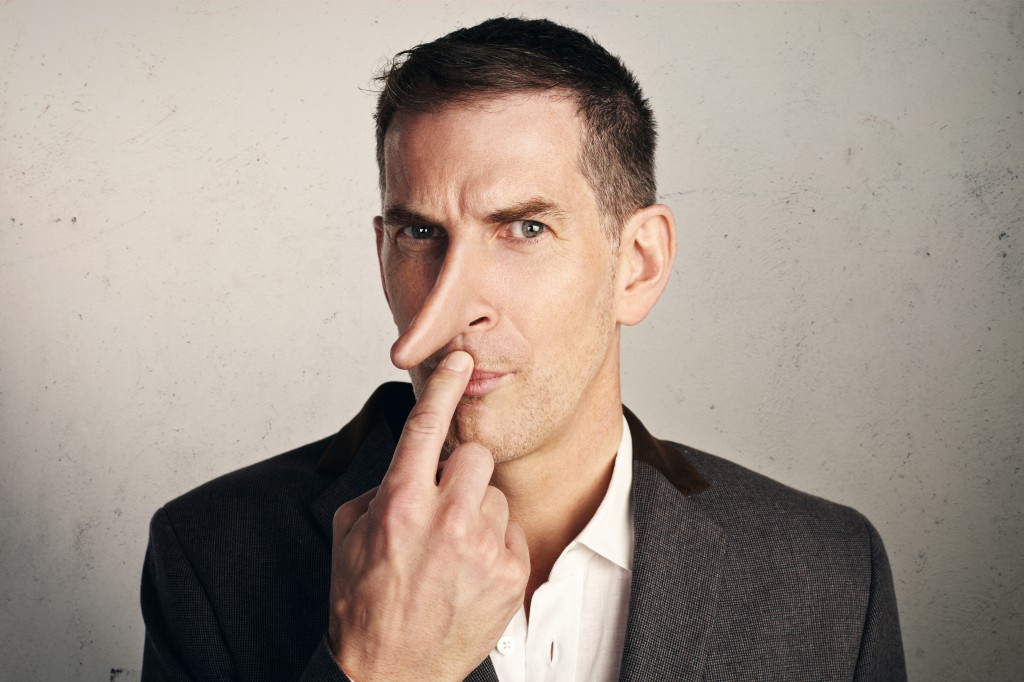
If I could teach only one value to live by, it would be this: Success will come and go, but integrity is forever. Integrity means doing the right thing at all times and in all circumstances, whether or not anyone is watching. It takes having the courage to do the right thing, no matter what the consequences will be. Building a reputation of integrity takes years, but it takes only a second to lose, so never allow yourself to ever do anything that would damage your integrity.
We live in a world where integrity isn’t talked about nearly enough. We live in a world where “the end justifies the means” has become an acceptable school of thought for far too many. Sales people overpromise and under deliver, all in the name of making their quota for the month. Applicants exaggerate in job interviews because they desperately need a job. CEOs overstate their projected earnings because they don’t want the board of directors to replace them. Entrepreneurs overstate their pro formas because they want the highest valuation possible from an investor. Investors understate a company’s value in order to negotiate a lower valuation in a deal. Customer service representatives cover up a mistake they made because they are afraid the client will leave them. Employees call in “sick” because they don’t have any more paid time off when they actually just need to get their Christmas shopping done. The list could go on and on, and in each case the person committing the act of dishonesty told themselves they had a perfectly valid reason why the end result justified their lack of integrity.
It may seem like people can gain power quickly and easily if they are willing to cut corners and act without the constraints of morality. Dishonesty may provide instant gratification in the moment but it will never last. I can think of several examples of people without integrity who are successful and who win without ever getting caught, which creates a false perception of the path to success that one should follow. After all, each person in the examples above could have gained the result they wanted in the moment, but unfortunately, that momentary result comes at an incredibly high price with far reaching consequences. That person has lost their ability to be trusted as a person of integrity, which is the most valuable quality anyone can have in their life. Profit in dollars or power is temporary, but profit in a network of people who trust you as a person of integrity is forever.
Every one person who trusts you will spread the word of that trust to at least a few of their associates, and word of your character will spread like wildfire. The value of the trust others have in you is far beyond anything that can be measured. For entrepreneurs it means investors that are willing to trust them with their money. For employees it means a manager or a boss that is willing to trust them with additional responsibility and growth opportunities. For companies it means customers that trust giving them more and more business. For you it means having an army of people that are willing to go the extra mile to help you because they know that recommending you to others will never bring damage to their own reputation of integrity. Yes, the value of the trust others have in you goes beyond anything that can be measured because it brings along with it limitless opportunities and endless possibilities.
Contrast that with the person who cannot be trusted as a person of integrity. Warren Buffet, Chairman and CEO of Berkshire Hathaway said it best:, “In looking for people to hire, look for three qualities: integrity, intelligence, and energy. And if they don’t have the first one, the other two will kill you.” A person’s dishonesty will eventually catch up to them. It may not be today, and it may not be for many years, but you can rest assured that at some point there will always be a reckoning.
A word of advice to those who are striving for a reputation of integrity: Avoid those who are not trustworthy. Do not do business with them. Do not associate with them. Do not make excuses for them. Do not allow yourself to get enticed into believing that “while they may be dishonest with others, they would never be dishonest with me.” If someone is dishonest in any aspect of his life you can be guaranteed that he will be dishonest in many aspects of his life. You cannot dismiss even those little acts of dishonesty, such as the person who takes two newspapers from the stand when they paid for only one. After all, if a person cannot be trusted in the simplest matters of honesty then how can they possibly be trusted to uphold lengthy and complex business contracts?
It is important to realize that others pay attention to those you have chosen to associate with, and they will inevitably judge your character by the character of your friends. Why is that? It is best explained by a quote my father often says when he is reminding me to be careful of the company I am keeping: “When you lie down with dogs you get fleas.” Inevitably we become more and more like the people we surround ourselves with day to day. If we surround ourselves with people who are dishonest and willing to cut corners to get ahead, then we’ll surely find ourselves following a pattern of first enduring their behavior, then accepting their behavior, and finally adopting their behavior. If you want to build a reputation as a person of integrity then surround yourself with people of integrity.
Article written by Amy Rees Anderson, sourced from Forbes Entrepreneurs.
How people rationalise fraud - Kelly Richmond Pope
If you ask people whether they think stealing is wrong, most of them would answer yes. And yet, in 2013, organizations all over the world lost an estimated total of $3.7 trillion to fraud.
Kelly Richmond Pope explains how the fraud triangle, (developed by criminologist Donald Cressey) can help us understand how seemingly good people can make unethical decisions in their daily lives.
Research shows that 40% of frauds are reported by a whistle-blower. If you saw a fraudulent act, would you report it?
Box Hill Golf Club - Interview

Two years ago marked a major milestone in the history of the Box Hill Golf Club – the centenary of the name, Box Hill Golf Club. The Box Hill Golf Club is a client of McPhail & Partners and we were delighted when Russell Donovan, General Manager, agreed to sit down with us and reveal what it takes to manage this great club.
1. How did you get involved with Box Hill Golf Club?
It has been a long involvement. I literally lived 500 metres away when I was growing up, I played all my junior golf at Box Hill and my family was heavily involved in the club. After my schooling, I worked for the Commonwealth Bank in business banking, then left the bank and managed a large pub in Hawthorn for five years. Long and late hours took its toll so I decided to try to get into golf club management, which resulted in General Manager’s positions at Churchill Park Golf Club, Mornington Golf Club and then to come full circle, back to Box Hill Golf Club as the General Manager.
2. What do you love most about your job or (this industry), and what do you see as the biggest challenge golf clubs face?
Everyone who visits the club is coming for an enjoyable time. Whether this is to play golf, coming to eat in the bistro or attending a function, we are in the hospitality business, in a role that I thoroughly enjoy. Concerning challenges, most golf clubs are struggling with retaining members. We are fortunate to be located in the Box Hill area, however maintaining a golf course and a clubhouse that is open 18 hours a day has its economic challenges. As you read regularly in the paper, penalty rates do affect a business of this size.
3. How do you rate your golfing abilities, do you play often?
I used to be a good player in my teens, now days with a busy business to run and a young family; it does not leave much time for golf!
4. Which is your favourite course in the world and why?
I was fortunate enough to attend the US Masters this year at a golf course called Augusta National. It would be the most pristine piece of land in the world. Every piece of grass is perfectly manicured, there was not one leaf on the ground, and if a tree dies, they replace it with a replica and this can mean a 30-foot tree is simply planted where the old one stood. But my favourite courses were in a place called Bandon Dunes, on the coast of Oregon in the United States.
5. Who is your favourite golfer?
I honestly do not have a favourite golfer, but always like an Aussie to win.
6. Tell us about a rewarding moment for you in the business and your involvement in it?
The club is very lucky that it can give back to the community. Every year, the club hosts a charity day for Eastern Health (Box Hill hospital), which raises approximately $25,000 each year. Our ladies committee hosts a second charity day and this raises in excess of $10,000 each year. We receive constant requests for donations such as golf rounds, bistro vouchers etc. that can be used at school/kindergarten auctions which we provide. Although we are a large business, we fully understand that we are a community-based club and will always continue to be community focused.
7. What untapped potential do you see with the golf club?
Box Hill Golf Club is different to most golf clubs in that we do allow social members, (at a cost of $2) to be members at the golf club, which allows them to visit the golf club, have a bite to eat in the bistro and take in the views of the course. The club undertook a renovation in the bistro/members area a couple of years ago and business has increased significantly in these areas. The club runs a very successful give golf a go program which is targeted at beginner ladies and the club is heavily focused on junior development.
8. How does BHGC differentiate itself from its competitors?
The simple response is that we are not just a golf club! The clubs bistro is open seven days a week, lunch and dinner and overall, we pride ourselves on being a friendly club where members and guests can visit in a safe, friendly environment with great views.
9. What do you do when you are not working?
I would love to say fitness fanatic, but running a golf club is a busy lifestyle so when I do get home, there is nothing better than playing with my two kids, aged 7 and 4, (when they are behaving). They are just starting to get into sport, so I am enjoying running after them.
Thank you Russell and we look forward to joining you in a game of golf soon at the Box Hill Golf Club!
[team size="one-half" last="true" name="Russell Donovan" title="General Manager, Box Hill Golf Club" icon="http://www.mcphail.com.au/wp-content/uploads/2015/08/August-Client-Interview-e1439869878857.jpg" facebook="" twitter="" gmail="" skype="" youtube="" linkedin="" ][/team]
The Kimberley Foundation
The Kimberley Foundation is a Private Charitable Trust which funds many programs and projects of Australian and some international not for profit organisations. They support organisations that are working towards long-term solutions to problems experienced by disadvantaged children and youth in our society in the areas of health, education and the arts.
McPhail & Partners are proud to be associated with this foundation and we would like to share a recent news update that Mitty Williams [Foundation Manager] wrote about the terrific work the foundation and others have recently achieved. The foundation works with a variety of programs and we thought you might be interested in some of the work that is being achieved across Australia.
Always another chance to get back on track!
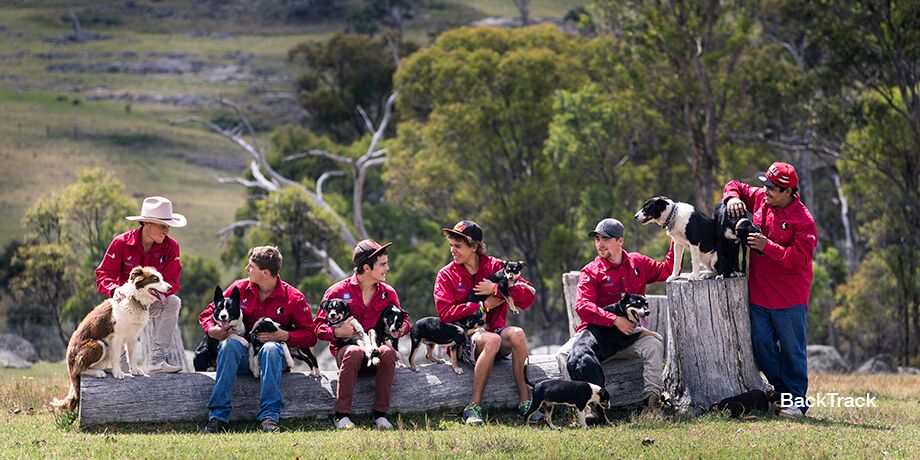
BackTrack is a wonderful program up in Armidale in northern New South Wales helping young people like those you see in this picture ‘put a head on their shoulders’.
The team, led by Bernie Shakeshaft, has been turning lives around. You can see in the young men, who jump right in when given a chance to learn and do some meaningful work, and you can see it in the statistics; juvenile crime in Armidale has dropped by 77%, a drop ‘unheard of’ anywhere else in NSW.
You can also see it in the community. There’s trust there, which has developed as the young people in the program learn and work and show they can be relied on. Paws Up, a terrific program that trains up a prize-wining dog high-jump team, has clearly helped the young people to re-learn trust too, along with self-discipline, confidence and communication skills.
This visit has been a highlight. It’s heart-warming to see the young people in the program thrive and I’m deeply impressed by the persistent hard work from Bernie and his team. Right now, Bernie is on a Churchill Scholarship researching how organisations like BackTrack have become financially sustainable.
To learn more about this private foundation and the organisations that they help, click here.
The Best Skill Set for Bolstering Your Finance Team
 If you could bolster your finance team with one particular skill set or expertise, which would it be? Deloitte reports on what the top finance executives are thinking and doing. Below is an extract from their findings.
If you could bolster your finance team with one particular skill set or expertise, which would it be? Deloitte reports on what the top finance executives are thinking and doing. Below is an extract from their findings.
Very strong demand for people who can effectively use data to influence business decisions:
• Strong demand for analytics expertise: about one-quarter of CFO’s say they would like to bolster their team with expertise around the gathering, analysis, and presentation aspects of analytics.
• Business acumen over technical finance skills: While some CFO’s mention a desire to add technical skills to their finance team [especially around FP&A and tax], many more voice a need for stronger business understanding and acumen.
• Leadership and influence highly valued: CFO’s voice a strong demand for people who can not only analyze and synthesize data, but also for those who can persuasively communicate insights and ideas to people throughout the business. Central to their comments, traits they believe go along with influential staff – curiosity, confidence, consultative skills, and big-picture thinking.
If you could bolster your finance team with one particular skill set or expertise, which would it be?
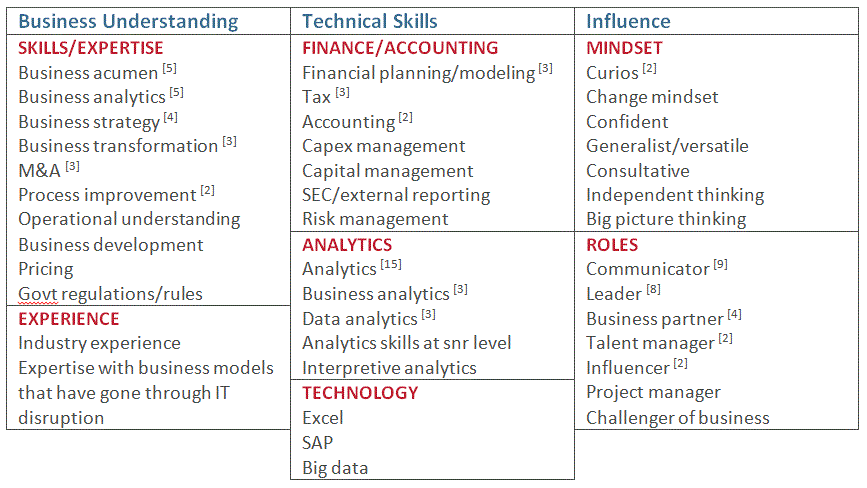
* This chart presents a summary of CFO's free-form responses. CFO comments have been consolidated and paraphrased.
Extract taken from Deloitte


